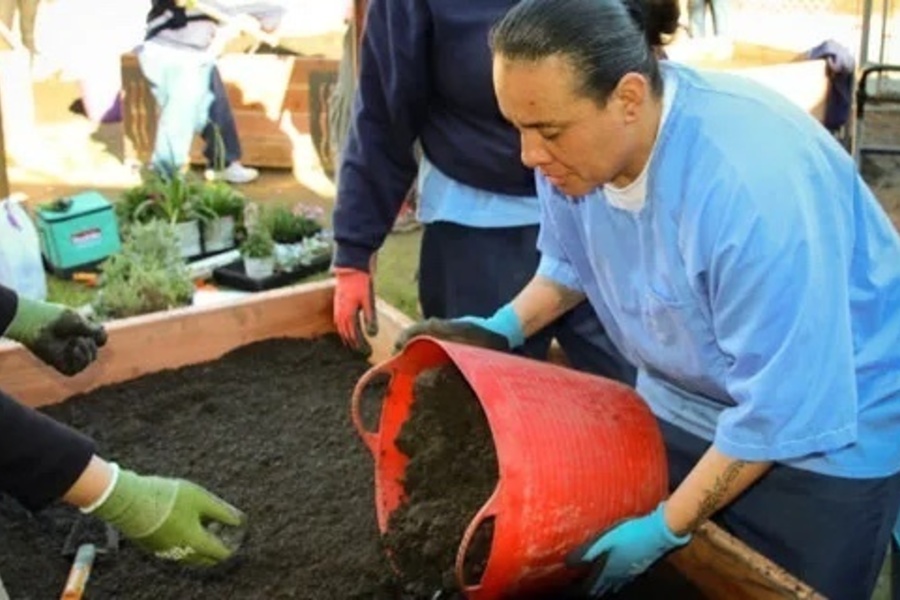Gardening in Incarceration - Insight Garden Program

Locations
- Avenal State Prison, California
- California State Prison Solano, California
- Central California Women's Facility, California
- San Quentin State Prison, California
Focus Area
- Criminal Justice
“What we do is way deeper than just gardening inside prisons. Not only are we literally planting seeds, we are also planting seeds of liberation, even within the confines of prison walls. We truly believe in providing an ecosystem of care, one that places interconnectedness and interrelatedness at the center.”
The Issue
Re-arrest rates among released prisoners paint a troubling picture. In 2016, a staggering 650,000 individuals were released from state and federal prisons. Shockingly, within three years, 68 percent of them found themselves back behind bars. This cycle of reincarceration perpetuates the challenges faced by those reentering society.
Violence is pervasive before, during, and after incarceration. Approximately half of state prisoners are serving time for violent offenses. Inside prison walls, one in five prisoners experiences physical assault within six months. Even post-release, three in ten individuals face re-arrest for violent offenses within three years.
Horticultural programs in correctional facilities have been shown to be cost-effective solutions, enhancing self-esteem, addressing mental health, and reducing recidivism. While some studies on horticultural interventions among juveniles yield inconclusive results on locus of control, they underscore the need for methodological rigor through randomized controlled trials.
Additionally, the complex link between poverty, incarceration, and limited access to nature cannot be overlooked. Environmental injustice, marked by disproportionate pollution impacts on minority and low-income communities, intersects with this issue. Alarmingly, 70 percent of low-income communities in the United States reside in nature-deprived areas, amplifying the consequences of environmental degradation on the most vulnerable.
Within prisons and jails, a stark economic disparity prevails, with incarcerated individuals disproportionately representing the impoverished. This inequality extends to communities of color, facing higher poverty rates and, consequently, dramatic overrepresentation in the nation's prisons and jails.
The Intervention
Insight Garden Program (IGP) facilitates an innovative curriculum combined with vocational gardening and landscaping training so that people in prison can reconnect to self, community, and the natural world. This “inner” and “outer” gardening approach transforms lives, ends ongoing cycles of incarceration, and creates safer communities.
IGP's 48-week curriculum is divided into four arcs of learning:
-
Environmental Education: Understanding ecosystems, from soil science to cosmic connections.
-
Permaculture Training: Cultivating gardens within prison yards, fostering joy and community.
-
Inner Gardening: Reflecting on inner growth, pruning negative influences, and nurturing personal development.
-
Reentry Readiness: Bridging in-prison programming with reentry services and leadership development.
As IGP describes it, their work “lies at the intersection of environmental justice, food justice, and lastly restorative justice. Just like an ecosystem, all are interconnected and interrelated.”
Research Question
How does an in-prison community gardening program affect locus of control, mental and physical health of incarcerated individuals?
Intended Outcomes
Participants in the Insight Garden Program will have less rules violations, less severe rules violations and improved self-reported mental health.
Participants in the Insight Garden Program will have lower rates of recidivism and long term reductions in violence and other behavioral changes, including improved relationships with family.
Research Study Design
LEO researchers will study the impact of the Insight Garden program through a randomized controlled trial (RCT). The RCT will compare outcomes between individuals at multiple institutions within the California Department of Corrections who (1) are eligible to join the program based on work and classification requirements, are interested in the program and are randomly selected into the participation group and (2) those who are eligible to join the program based on work and classification requirements, are interested in the program but are not randomly selected to participate in the program.
Consent, randomization, and a baseline survey will be conducted at a reserved location with a pool of eligible and interested potential study participants. Treatment group participants will proceed with Insight Garden Program programming, and control group participants will not. This collaboration will be the first RCT of an ecotherapy program in prison ever conducted in the United States.
Photo by: Insight Garden Program